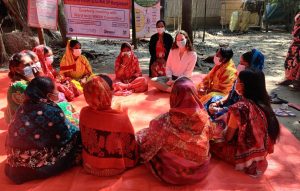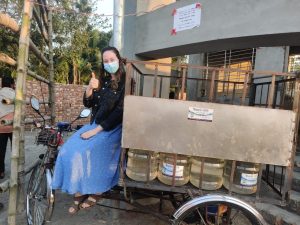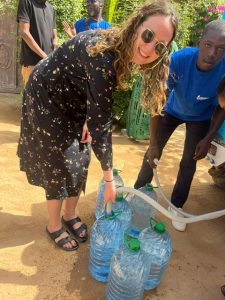For her thesis for her master’s in international development, Sarah Kalin, our Programme Manager West Africa, researched the effects of climate-related floodings on populations and migration in the Myanmar Delta, which was her entry point to the water sector. After graduating she did an internship at World Waternet, where she was responsible for organising the Sarphati Sanitation Award, a partnership between World Waternet and Aqua for All. The latter invited Sarah to an internship and now, four and a half years later, she is still with us and we asked her to share her experiences over the past four years.
What is your current role at Aqua for All and what does a day for you look like?

I recently transitioned from my role as Programme Manager for Bangladesh and Kenya to becoming Programme Manager for West Africa. When I joined Aqua for All, we had just launched the Making Water Count programme and we were busy building the programme and developing partnerships. We are no longer developing new Making Water Count proposals, allowing me to focus on monitoring current projects and getting involved with our partners. I maintain relationships with external partners, including stakeholders and funders in the sector. We exchange experiences and try to identify opportunities to build the ecosystems in the countries we work with.
How has your career developed since you started as a communications intern?
It’s evolved a ton. The nice thing about Aqua for All is that I really have had the freedom to pursue work that interests me and seek out my own opportunities within the organisation. This started with helping set up the COVID-19 Response Facility. I got to continue working with the Sarphati programme, which we developed into the Sarphati Sanitation Challenge. It was my first experience working with acceleration programmes which we now do in nearly all of our focus countries, and I have been involved in many of them.
Bangladesh shares many water issues with Myanmar, the focus of my thesis, and this eventually became my primary responsibility within Aqua for All. It is fascinating to have opportunities to grow into new positions and work on diverse projects, develop new skills, and engage with different countries. While managing the Bangladesh portfolio, I could take on projects in East Africa and Kenya which gave me a new perspective strengthening my work across these countries.
You have worked in different countries. What are the differences regarding the challenges they’re facing?

I have worked extensively in Bangladesh and Kenya, and I recently transitioned to focus on four new countries in West Africa. I’m beginning to familiarise myself with the water sector there, and it’s interesting to understand where the differences and similarities are. Many of the issues for entrepreneurs are the same across countries and sectors. Between the different countries the main challenges come from the types of water challenges per country and region, the entrepreneurial ecosystem, the governance and regulatory frameworks as well as the local cultural practices and social norms related to water and sanitation services.
Kenya has a more robust and consistent private sector for water service delivery compared to Bangladesh, where they are more reliant on the government, NGOs and community-based organisations. This translates to a lot less awareness on WASH businesses in the ecosystem there. It influences how we work, every country has a different starting point in terms of private sector WASH service delivery and access to finance.
You have spent two months in the field in Bangladesh. What struck you the most?
I had never set foot in Bangladesh because of COVID-19 and spending a few months there was invaluable for me to understand the county and the context that our partners are working in. I spent a lot of time doing field visits, which allowed me to grasp the challenges and opportunities within a specific context as well as the impact of the work.
When you’re working in the Hague, a project impacting a hundred people can feel small compared to the size of the global problem. But in Bangladesh, I had the opportunity to talk with families who gained access to water or sanitation and the impact for one household is invaluable. This inspires me and helps keep the perspective of what our partners are able to accomplish with our support.
How has Aqua for All developed since you joined?
I joined six months after the start of our Making Water Count programme. As we transitioned into this new programme we explored the impact finance sector and initiated discussions on the Impact Linked Finance (ILF) programme. These initiatives have evolved into full-fledged programmes now operating at the same level as the market development team. The way we position ourselves and are viewed by stakeholders has changed because of our new strategy, we are now an international foundation that people are familiar with.
How has the water sector changed since you joined Aqua for All?
Currently, many organisations are shifting towards market-based approaches and private sector engagement and finance. Many activities in the WASH sector have traditionally been carried out within the NGO and grant framework, and it’s clear that in many cases this has not been sustainable nor sufficient to address the scale of the problem. Like Aqua for All, many organisations are striving for more efficiency and long-term approaches.
Has Aqua for All played an important role in this change or is it more a general trend?

I think it is a general trend, a result of seeing the same initiatives not working. When we launched the WAKE-UP programme in Kenya, there were not many programmes with this focus in the countries where we work. There are still not a ton of similar programmes, but there is more support for private sector actors and the SME ecosystem as everyone comes to the same conclusion and funders and stakeholders become more interested in supporting these initiatives. However, I do think that Aqua for All is able to take an innovative position and take on some risk to prove these concepts.
To end on an inspirational note, what do you love most about your work and what are you most proud of?
What I love most is meeting impact-driven entrepreneurs who are extremely creative, passionate, energised, and always on the go to find solutions to very complex challenges. It is deeply inspiring to work with people who work extremely hard and try to make a change, and it is exciting to support them in any way we can.
Our partners are the ones driving the initiatives, however, I really appreciate how we can help them by providing grant support, accompanying them in refining their ideas or connecting them to other investors. It is rewarding when partners tell us how crucial and impactful our support was for them. I am proud that we can play a role in their story, especially if they found support with us that they were unable to find elsewhere.